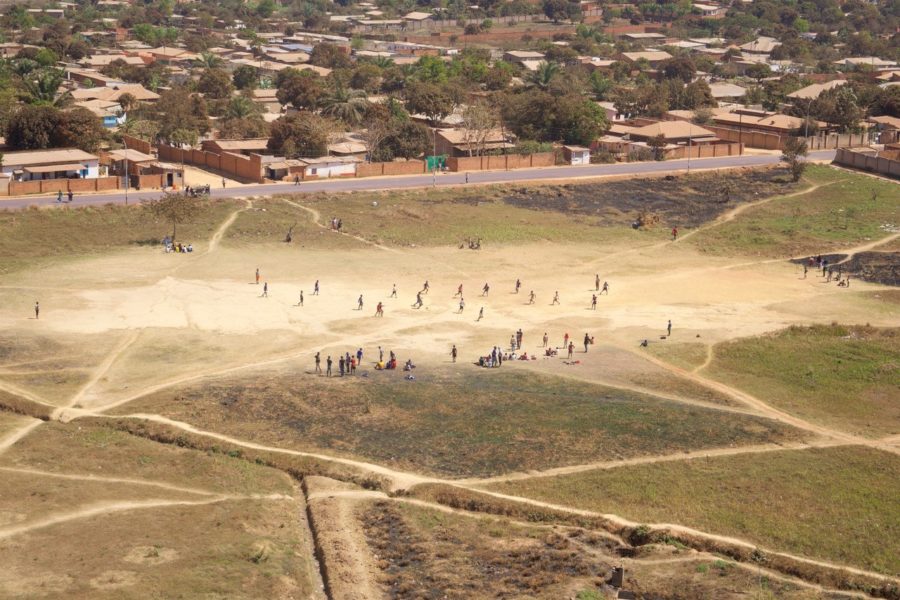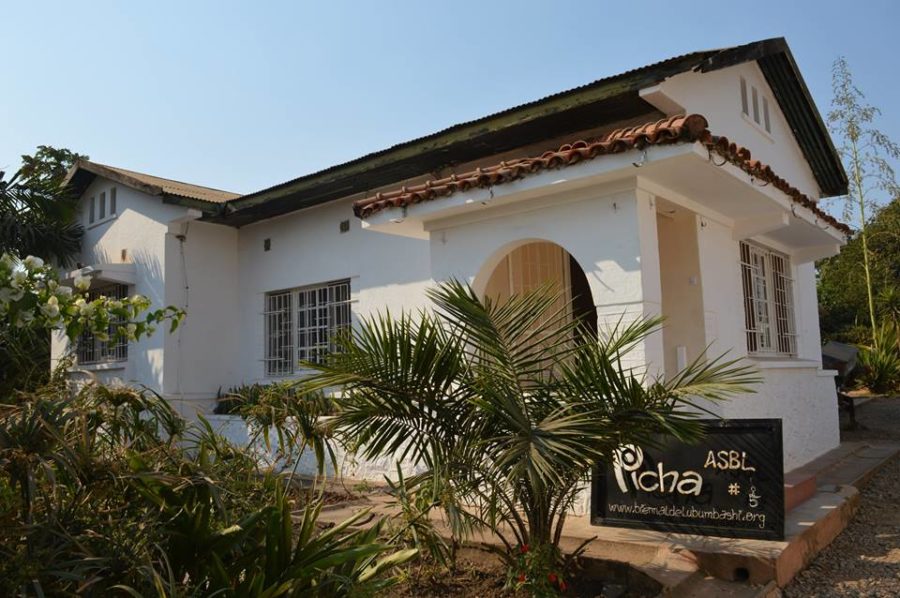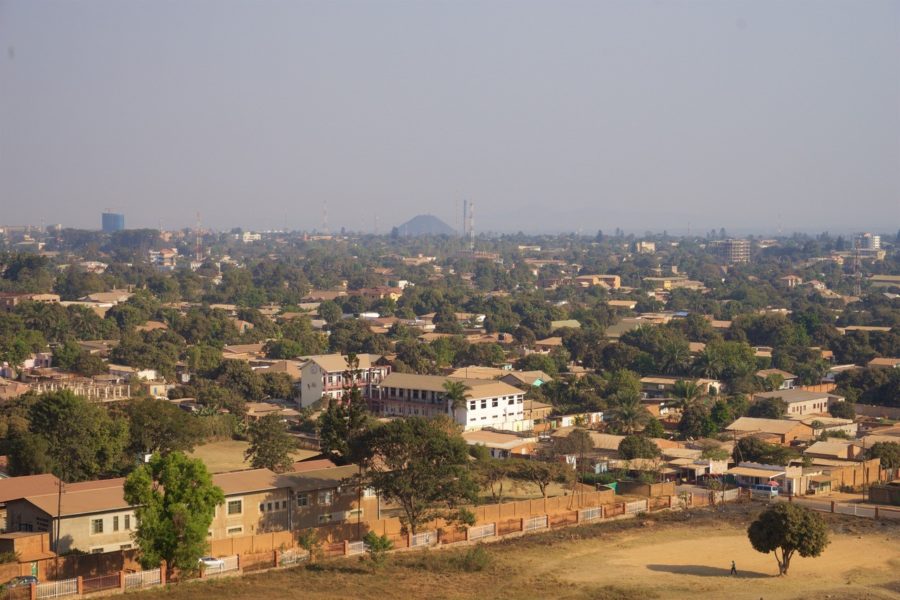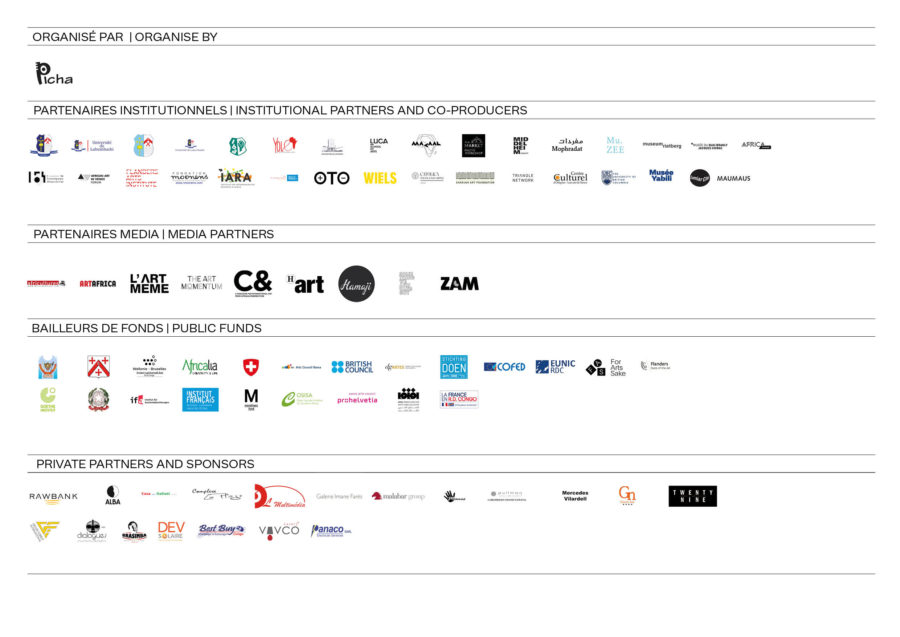ABOUT
The Biennale 2019

Julien De Bock
The 6th edition of the Lubumbashi Biennale, entitled Future Genealogies, Tales From The Equatorial Line, probes the possibilities of repurposing the cartography of the world. One of the seven African countries crossed by the equator, the Congo claims the longest segment of the parallel on the continent. This places the region not only at the heart of Africa, but also at the bisecting line of the globe, at the zone of intersection between southern and northern hemispheres. By asserting this position, the Biennale repeals the modern fantasy of the Congo as “irrelevant locale on the periphery of cultural history” to reclaim its profound entanglement with the world and its globally central position, both past and present. The concept of the Biennale is to take the equator’s imaginary line not as one of demarcation—the majestic Congo River disregards it by straddling it twice—but rather of imbrication. At its closest a place where earth gravity alleviates and where the poles’ magnetic attractions balance each other, the equatorial latitude opens the possibility for narratives that respond to alternate compasses, recognizes new centers of gravity and where de-polarized stories can unfold. At the same time, a region where the sun rises and sets quicker than anywhere else, the swift transition from night to day reminds that the possibility for renewal and change is always on the horizon. The Biennale wishes to explore the geographical paradox of being set in a region where history continues to be steeped in the depth of the soil’s resources, but whose unique position also has the potential to serve as a model to uproot established perspectives.
Taking its cue from the philosopher Achille Mbembe’s notion of “décloisonnement” (“decompartmentalization”, Ecrire l’Afrique-Monde, 2017), the Biennale pries open the equatorial line to collapse paradigms of center and periphery, of “North” versus “South”. As unambiguously enunciated by the Cameroonian thinker, “there is no part of the world whose history does not have some African dimension, just as there is an African history only as an integral part of the world’s history”. This edition of the Biennale is interested in mapping these connections and in tracing these genealogies in new ways. At a time when the restitution of looted African artworks has become an burning geopolitical issue, and when museum institutions around the world are urged to proceed to their “decolonization” art and images are at the heart of a shift in global dynamics. The Biennale wishes to seize that moment to produce new narratives of the past and to re-imagine a plurality of futures.
The two different seasons that simultaneously overlap in the country—above and below the median parallel—are inspiration to explore how different temporalities inform the present. Anchored in the history of the city and its photographic past, the Biennale is conceived as a two-folded platform—historical and contemporary. The historical axis revisits the local uses of photography in the Congo, both by the colonial propaganda and African practitioners of the time. Based on previous research and on a new image call, the integration of these private archives in the reinterpretation of Congo’s colonial past allows to subvert and reshape the dominant historical narratives. By opposition to the contemporary situation that still sees the West too often hold the exclusivity of the commentary about the colonial past, this exhibition is intended as a repatriation of the discussion about colonial visual regimes to the Congolese communities of people and artists.
Expanding on this reflection about the deconstruction of past narratives, the contemporary axis proposes to local and international artists to explore the modalities of inventing new constellations of ideas, persons and communities. The project is to decenter readings of our present world taking the equator as the “latitude zero” and to rebuild its connections to both hemispheres. How can we imagine present and future stories that do justice to other latitudes, and yet recognize the interdependence of our globe? How to project a common humanity that does not awaken the universalist meta-narratives of the modern era and their excesses? At a time when the urgency of climate change relentlessly binds our common fates, it is imperative to decompartmentalize the old genealogies while producing new solidarities that ignore the dichotomies, and manage to project future entanglements. As stated by Achille Mbembe and Felwine Sarr in the proceedings of the last Ateliers de la Pensée of Dakar, “There is no longer any history that is at the same time that of human persons, technical ensembles, objects, mineral matter, organic vegetable and geoclimatic, even spirits.” (Mbembe and Sarr, Ecrire l’Afrique Monde, 2017). Due to its history and current situation, Lubumbashi offers an extremely strategic observation and creation platform to develop these new stories. Born out of the desire to exploit the extraordinary wealth of the soil of the region, the city and the society of Lubumbashi are the products of a close relationship to the Katangese land, whereas it is precisely these local resources which made it a key locus of the world geopolitics. This inseparable link between local and global makes the Lubumbashi Biennale a laboratory for cardinal reflection on the post-colonial, ecological and migratory issues of our time.
In many respects, the year of this 2019 new edition marks a pivotal moment of history. It is a time when many countries in Africa are about to celebrate the 60th anniversary of their independences; when the Berlin Wall will have fallen almost exactly 30 years ago; and when the global upheaval of 1968 is a little over 50 year-old. These events have largely shaped the post-socialist and post-colonial “constellation” in which the world has since lived in. At the same time, the signs of climate change underway, as well as the rise of new waves of feminism and migration undeniably propel us into a new era. The Biennale proposes to seize that turning point, to linger on this epochal threshold to deploy the array of imaginative ideas and creations that our societies will need to persist.
The curatorial concept of the 6th edition of the Biennale de Lubumbashi was conceived by Artistic Director Sandrine Colard.
The team

© Julien De Bock
Sammy Baloji lives and works in Lubumbashi and Brussels. Since 2005, he has been exploring the memory and history of the Democratic Republic of Congo. His work relates to the cultural, architectural and industrial heritage of the Katanga region and the impact of Belgian colonisation. Ethnography, architecture and urbanism are the themes of his artistic practice, consisting in photography, video, installation and archival documents relating to colonial history. In 2008, he co-founded the non-profit association Picha, a collective initiative that organises the Biennale de Lubumbashi and supports the development of local artistic practice. He is currently President of the association.
Currently assistant professor at Rutgers University, Sandrine Colard is a specialist of modern and contemporary African art history, a writer, and an independent curator. Holding a PhD from Columbia University in New York, Colard is an international lecturer (Concordia University, EHESS, Wiels, Bozar, European Parliament) and the author of multiple publications (African Arts, Critical Interventions, L’Art Même, Cahiers du CAP, Cultures et Musées). Her writings include contributions to exhibition catalogs such as Sammy Baloji: Hunting and Collecting. A Research Project (Mu.ZEE, Ostend, 2016), and The Expanded Subject: New Perspectives in Photographic Portraiture from Africa (Hirmer, 2016), for which she was co-curator at the Wallach Art Gallery (New York, 2016). Sandrine Colard is currently preparing The Way She Looks: A History of Female Gazes in African Photography, in collaboration with the Artur Walther Collection (Ryerson Image Center, Toronto, 2019). Her research has been supported by numerous fellowships, among which that of the quai Branly Museum and the Institut National d’Histoire de l’Art of Paris (Labex Cap).
Pierre-Philippe Duchâtelet lives and works in Brussels. He graduated in Visual Arts from the Erg. After a first cycle in communication studies, he began a bachelor and a master in visual arts at the end of which he created the graphic design studio La Villa Hermosa with Lionel Maes. Since 2008, La Villa Hermosa has developed various projects of scenography, visual identity, publishing, web platform in collaboration with various actors of the cultural world of Brussels. Pierre-Philippe is now a teacher at the Erg, a member of the T.A.L.O.S. collective, a fellow of the “A/R” research fund in 2018, a researcher and a designer. He is currently working on the visual identity and scenography of the 2019 edition of the Biennale de Lubumbashi. Since September 2017, he is also a student of the master’s degree in Visual Cultures from the Catholic University of Louvain. Finally, he initiates and coordinates the Master Design and Politics of multiple at the Erg since 2018.
Aimé Kalenda lives and works in Lubumbashi. Trained as statistician, Aimé Kalenda has always been close to artists in Lubumbashi, in a dynamic of concrete and logistical support. Responsible for the production of exhibitions and logistics during several editions of the Biennale de Lubumbashi, he now performs a steering mission of the association as vice-president. He has been a permanent contributor to the project since 2006 by setting up a screen printing workshop in Lubumbashi and Makwacha aiming at revisiting and enhancing the traditional practice of mural painting with textile screen printing.
Graduate in Design & Multimedia at the Salama School of Computer Science (ESIS), Damiette Kanowa is secretary and administrative assistant of the association Picha. Formed by Rosemary Tshawila, she has been employed by the non-profit organisation for 4 years. Damiette Kanowa is responsible for managing the activities of the Hangar art center at Complexe La Plage, where Picha organises exhibitions of local and Congolese artists.
Jean Katambayi Mukendi lives and works in Lubumbashi. Jean Katambayi Mukendi is an artist passionate about technology, mechanics, geometry and electricity. In his work, he combines the influences of everyday life with the knowledge of his training as an electrician. He creates complex and fragile installations, powered by sophisticated electric mechanisms. His technological inventions are a quest for solutions to the social problems of Congolese society. He has been a member of Picha since 2015 and is actively involved in the Biennale de Lubumbashi, both as an artist and technical assistant to the guest artists.
Lissa Kinnaer lives and works in Brussels. She is international relations officer for visual arts at Flanders Arts Institute, a sector institute supporting and promoting the visual arts, performing arts and music scene in Flanders, Belgium. She holds a Master’s degree in Germanic Literature from the Free University of Brussels and a Master’s degree in Cultural Studies from Goldsmiths College, University of London. In 2004 she worked as assistant curator at INIVA – Institute of International Visual Arts in London. Between 2005 and 2006 she worked as project coordinator for BOZAR – Center for Fine Arts and the Kunstenfestivaldesarts in Brussels. From 2006 until 2011, she was coordinator of the Réseau des Arts à Bruxelles, a network of cultural organisations in Brussels. In 2011, she was appointed international relations officer at BAM, the Flemish Institute for Visual, Audiovisual and Media Art.
Born in France, Céline de Laissardière lived in Québec (Canada) for ten years, and now she is settling in Lubumbashi. She recently graduated from a master’s degree in Anthropology at Laval University (Québec). Her research delved into the formation of singular literary discourse of First Nations women writers in Québec, in understanding the dynamics of creation and recognition of new imaginaries. Céline is also interested in the socio-environmental impacts of the mining industry, at first in Canada and now here in the Congo. She is currently setting up a project around these issues. Passionate about art, she devotes herself to writing, photography and dance.
Annick M’Kele is a Belgian journalist and novelist. Her first novel, Rodéo, published under the pseudonym Aïko Solovkine, won the Prize for the first work of the Wallonia-Brussels Federation in 2016. She is the author of two plays, Rwanda Inc. and Mare Nostrum which was performed in January 2019 at the Théâtre de la Vie in Brussels. She has also published several short stories, the latest of which was published in 2019 by Magellan & Cie in the collection Nouvelles de Belgique. Annick has been working with the team of the Biennale de Lubumbashi since the 5th edition in 2015 as text editor.
Born in Lubumbashi, Trésor Malaya is a visual artist and performer. A graduate of the Lubumbashi Academy of Fine Arts, he participated in numerous training and creative workshops that refined his artistic approach. In 2000, he participated in a workshop led by Aimé Mpane, and another workshop by the visual artist Disundi in 2001. From 2001 to 2007, he joined the Palanca Negra Gallery in Angola during his journey in southern Africa. In addition to his personal work, he participates in collective projects, with the Malaika group in particular.
Graduate in economics, then initiated into theater, contemporary dance, audiovisual techniques and multimedia, it is as an artist that Douglas Masamuna likes to be perceived. He defines himself as a man who likes to tell stories, and to do so, he uses all mediums of narration (text, photography, video, audio, drawings, etc.). General Secretary of DL Multimédia asbl, a structure specializing in audiovisual and multimedia research and production, he is also coordinator of the Kidogo Kidogo Festival dedicated to short films. Trainer and lecturer in some universities of Lubumbashi, his career is made of both artistic productions and various collaborations.
Alexandre Mulongo Finkelstein lives and works in Lubumbashi. A writer, rapper, screenwriter and journalist, he is a member of Picha since 2008 as head administration and coordinator of the organisation’s activities.
Born in Lubumbashi, Patient Ngoy Ilunga is a second-year student at the Faculty of Letters and Human Sciences, Department of Letters and Literature (Civilization) English. Writer, literary critic, poet whose first critical work is “Irony as seen in Edgar Allan Poe ‘s The Cask of Amontillado: knowledge versus ignorance”, he is also a teacher of English as a second language (ESL) at the Laboratory of English where he also works as the academy’s manager.
Alain Nsenga lives in Lubumbashi where he works as a graphic designer and photographer. He produces work for local artists and businesses. He studied Design & Multimedia at the School of Computer Science Salama (ESIS) where he teaches today. His photographic work is a permanent quest for originality and authenticity. His meeting with Picha and his collaboration with the organisation as graphic designer led him to participate in several workshops and to work with the team of the Biennial de Lubumbashi since the 3rd edition in 2013. Currently, his work focuses on questions of identity, a self-assertion out of the artifices imposed by the gaze of others.
Arlette Panu graduated in Design & Multimedia at the Salama School of Computer Science (Esis) in Lubumbashi. She works as a trainee for the Biennale de Lubumbashi and follows up on administrative tasks.
Born in Italy, Gabriele Salmi studied modern literature and political science and worked for a communication company in the film industry. In 2004, tempted by the world of international cooperation and fascinated by the rich history of the Congo, he volunteered for ALBA, an Italian non profit organisation dedicated to the education of children. He took part in the creation of the educational project of the American Tenke Fungurume Mining, and coordinated a project of the World Food Programme bringing one hundred trucks for the distribution of humanitarian aid in different places in the country. He co-produced several documentaries together with the filmmaker and documentary maker Douglas Ntimasiemi. He was also co-producer of the documentary by Sammy Baloji and Filip De Boeck “Pungulume” produced by Auguste Orts. He joined Picha in 2016, as a collaborator, supporter and sponsor. He actively participated in the organisation of the 5th edition of the Biennale de Lubumbashi by bringing logistical support and raising funds from sponsors.
Georges Senga is a photographer, lives and works in Lubumbashi and Maastricht. He obtained a degree in human sciences at UNILU in 2009. During the Biennale de Lubumbashi “Rencontres Picha” he took part in a workshop of the Belgian photographer Marie-Françoise Plissart mounted with Sammy Baloji and Gulda El Magambo. As a result of this experiment, Georges spent six months working on a project on Katanga’s urban landscape entitled My new ceilings. In 2009, he won the special prize of the second edition of the Africa Photo Contest of Tarifa (Spain). His work combines documentary elements with fictitious elements. He has been a member of Picha since 2015 and is actively involved in the Biennale de Lubumbashi, both as an artist and technical assistant to guest artists.
Rosa Spaliviero lives and works mainly between Brussels and Lubumbashi. She has been coordinating cultural events and curating film programmes as a freelancer since 2006. From 2006 to 2010 she worked as film programme assistant of Pedro Pimenta, director of the Dockanema Documentary Film Festival in Maputo, Mozambique. Expert in film and audiovisual productions from Africa, she worked for 7 years as a film producer for Atelier Graphoui, an experimental audiovisual production workspace in Brussels. Today, as an independent film producer, she produces innovative films by filmmakers and artists based in Dakar, Kinshasa, Brussels or Lubumbashi. As a founding member of Picha, she has been involved in the organisation of the Biennale de Lubumbashi since 2008.
Aude Tournaye obtained a master’s degree in art history, archaeology and philosophy at the Vrije Universiteit Brussel, Brussels, after which she continued her studies in art criticism and curatorship at Columbia University, New York. She works as an independent curator and art critic between Europe and Africa. Her texts have appeared in exhibition catalogues and magazines such as De Witte Raaf, H Art Magazine, Daily Wrestling / Without Negotiation (La cloche des Fourmis, Dakar, 2018) and Material Insanity (MACAAL, Marrakech, 2019).
Born in Gungu in Kwilu province, Maguy Watunia Mampasi attended primary and secondary school in Siama (Kikwit) and her university studies at the University of Lubumbashi. With a degree in Cultural History, she works at the University of Likasi as Assistant to the Faculty of Letters and as Associate Dean of Research at the Faculty of Geology. In addition to her professional activities, she continues her postgraduate studies at the University of Lubumbashi. In 2004, she worked at the Kipalu Spiritual Center in Kikwit. From 2005 to 2008, she was manager at a hospital in Kikwit Sacré-Coeur and from 2011 to 2012 she worked for the guest house in Taizé, France.
Bachelor of Fine Arts at the Academy of Fine Arts in Kinshasa, Benjamin Yumba lives and works in Lubumbashi. He navigates between painting, photography, installation and video. Since 2007, he has participated in several collective exhibitions between Lubumbashi and Kinshasa. In 2011, he collaborated with Plantu from Le Monde, as part of an event organized by Cartooning for Peace. In 2015, he took part in the production of the work of Brazilian artist Henrique Oliveira at the Institute of Fine Arts in Lubumbashi. Benjamin Yumba continues to train and pursue new artistic inspirations.
Picha

Picha is an initiative of artists operating independently from Lubumbashi that supports and promotes artistic creation in the Democratic Republic of Congo. Picha provides visibility for contemporary art in Lubumbashi by providing a venue for exhibitions, meetings, artist residencies, training workshops and artistic accompaniment.
Picha intends to promote artistic creation by taking as the urban space as a stage and the image as a medium. Picha wants to bring an artistic reflection, both endogenous and speaking to the world, on the city of Lubumbashi, its history and its environment today. In addition to the organization of the Biennale de Lubumbashi, the association has to its credit the realization of several exhibitions, video and photo workshops, training programs and artist residencies, conducted with the aim of offering national and international exposure to local artists and arts initiatives.
To fulfill its mission, Picha has created the following platforms:
– The Biennale de Lubumbashi, founded in 2008 under the name of “Rencontres Picha”, has become one of the most experimental and dynamic artistic events on the African continent, offering a platform for presentation and meeting to local and international artists and cultural actors local.
– Atelier Picha is a permanent training program dedicated to the production and dissemination of participatory artistic and cultural projects. Atelier Picha allows the networking of a new generation of Congolese artists and cultural producers with other national and international cultural actors. The program offers a period of research and production and professional accompaniment to young people in the conceptualization of their project. Since 2017, Picha has allowed a dozen emerging artists from across the country to participate in the workshops. In 2019 and 2020, Atelier Picha collaborates with Picha’s partner institutions, such as Sharjah Art Foundation (Sharjah), Market Photo Workshop (Johannesburg), Gasworks (London), Art Hub Asia (Shanghai), Universidad Distrital de Colombia (Bogota), Raw Material Company (Dakar). The artistic direction is led by Lucrezia Cippitelli.
– The Picha Residence Program, initiated in 2014, invites artists from the African continent and abroad for a research and production period in Lubumbashi.
– The Hangar Gallery, founded in 2015, is a locally-run exhibition space that promotes the work of local artists.
More information: picha-association.org
Lubumbashi

© Julien De Bock
Lubumbashi is the second largest city in Democratic Republic of the Congo. The main industrial centre of the mining district of southeastern Congo, it lies 110 miles (180 km) northwest of Ndola, Zambia. Lubumbashi is the name of a small local river. The town was established by Belgian colonists in 1910 as a copper-mining settlement and was designated an urban district in 1942. Most regional mining companies are headquartered in Lubumbashi, which is the transportation centre for mineral products (copper, cobalt, zinc, cadmium, germanium, tin, manganese, and coal) from the towns of Likasi, Kolwezi, Kipushi, and others. Mineral exploitation has been dominated by a government-owned organisation, but foreign mining companies are also in evidence. The city’s other industries include printing, brewing, flour milling, and the production of confectionery, cigarettes, brick, and soap. Lubumbashi has a civic auditorium, a national museum, a Roman Catholic cathedral, and the Society of Congo Historians, as well as the University of Lubumbashi founded in 1955.
Partners
